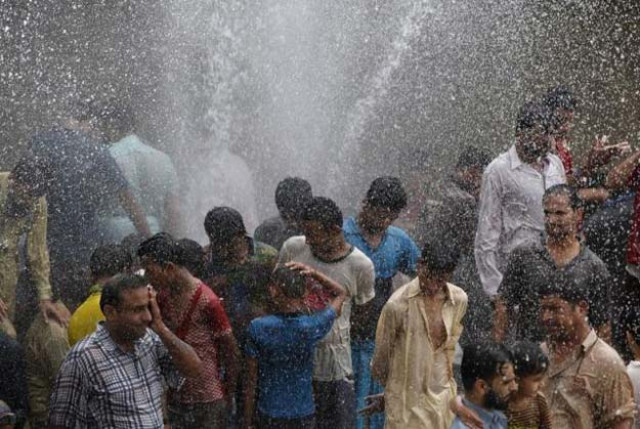How to survive summer heatwaves
Being mindful of heat stroke can allow you to reclaim all the golden sun soaked summer fun

People cool off from the heat as they are sprayed with water jetting out from a leaking water pipeline in Karachi, Pakistan, June 25, 2015. PHOTO: REUTERS
Heatwave likely to hit by end May or early June: Met dept
Cause and effect
Heat exhaustion and heat stroke are two interrelated conditions which may quickly put victims in clutches of death. Heat exhaustion results from a drop in blood pressure which may be brought on by depletion of salt or water. Prolongation of symptoms of heat exhaustion leads to heat stroke which ultimately causes irreparable damage to the vital organs of the body. Symptoms of heat exhaustion develop rapidly and include;
· Flushed skin
· Increased sweating
· Extreme tiredness
· Feeling sick (nausea) and vomiting
· Increased heart rate
· Confusion and dizziness
· Infrequent urination and dark color urine
On the other hand, heat stroke is body’s inability to cool down following excessive heat exposure. Heat stroke is considered a medical emergency and its symptoms, which may take several days to appear, include:
· Body temperature of 104 ºF, which may develop without prior signs of heat exhaustion.
· Dry skin which signifies body’s inability to produce sweat or heavy sweating that suddenly stops as water stores in the body are depleted, a major sign of dehydration and overheating.
· Rapid heartbeat.
· Hyper ventilation which is rapid shallow breathing.
· Muscle cramps.
Heat stroke can also affect the nervous system and lead to seizures or fits, hallucination, lack of co-ordination, anxiety and loss of consciousness.
As temperature rises, city goes into preparatory mode
First aid for heat exhaustion
Signs of heat exhaustion necessitate immediate attention in order to prevent lasting damage to the body or death of victim. If you suspect that someone is suffering from heat exhaustion, follow the advised protocol immediately:
· Move the person to a cool, shaded place with fresh air or air conditioning.
· Get them to drink plenty of fluids to replenish depleted water levels. Rehydration drinks or sports drinks are also recommended.
· Avoid caffeine as it can lead to worsening of dehydration.
· Use cool water (not cold water) on the skin through shower or facecloth to bring down core body temperature.
· Loosen tight clothing to increase ventilation.
· Do not give them any medication like Aspirin or Paracetamol.
If the person does not respond to any of these treatments within 30 minutes, seek medical help without delay.



















COMMENTS
Comments are moderated and generally will be posted if they are on-topic and not abusive.
For more information, please see our Comments FAQ